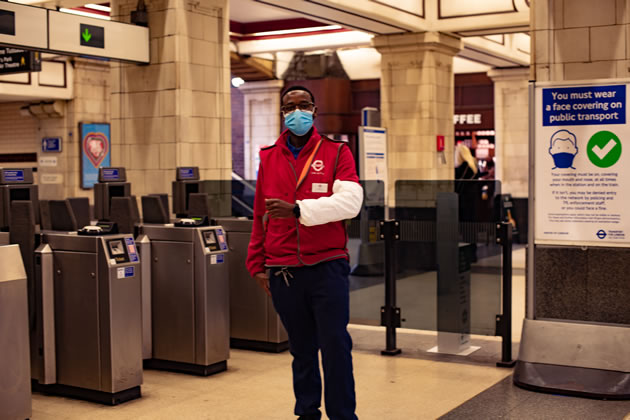TfL Restore Support For Visually Impaired on the Tube
Physical sighted assistance to be offered to passengers in need again

TfL staff can again 'offer an elbow' to a partially sighted person
Transport for London (TfL) has this week reinstated a crucial service for disabled passengers that it scrapped during the coronavirus pandemic.
To help all Londoners get around the capital, the network normally provides ‘physical sighted assistance’ at Underground and Overground stations.
Clive Wood, of sight loss charity Guide Dogs, describes this as “essentially an elbow”: staff offer their arm to guide passengers from the station entrance to their platform.
It is an “essential element of independent travel” for blind or partially sighted people, according to Mr Wood. It may also be used by travellers with dementia or autism.
But at the start of the Covid-19 outbreak, TfL cut the service – despite the fact that train companies across the country continued to provide physical guiding, using PPE to keep staff safe.
The change left one woman stranded at King’s Cross station: she was refused physical help on the Underground after arriving on a national rail service, Mr Wood said.
TfL did offer an alternative throughout the pandemic, paying for a taxi to take disabled travellers to a station which was accessible.
But Mr Wood – who is London and South East policy manager for Guide Dogs – said this service “wasn’t working” as there were “a lot of inconsistencies”.
On one occasion, a young man was taken by taxi to an accessible station but abandoned outside the entrance.
He had to video call his mother so that she could see where he was and guide him to the door through his phone, Mr Wood said.
But the policy manager is “confident” that reinstating physical assistance will solve these problems.
“It’s going to make a massive difference to many blind and partially sighted people, who believe it or not have to make essential journeys and want to be able to do it independently,” he said.
Mr Wood said Guide Dogs has an “excellent” relationship with TfL, who usually stand out for the work they do to “proactively encourage” disabled travellers to turn up at stations without needing to book help.
“That’s what made it even more frustrating: that suddenly this level of support was taken away,” he said.
“We understand that the safety and welfare of staff is important, and TfL staff are wonderful – but we really didn’t get to the bottom of why this happened.”
Liberal Democrat London Assembly member Caroline Pidgeon has pushed for the service to be reinstated throughout the pandemic, and welcomed its return.
But she believes physical assistance should never have been cut, and called on the Mayor to apologise to disabled passengers.
“Such vital support was never taken away by train companies operating around the country,” Ms Pidgeon said.
“Safety of staff and essential support for disabled passengers have both been met – but sadly on TfL services there have been some truly horrific experiences for blind and disabled passengers.
“We are told repeatedly that ‘every journey matters’ for the Mayor and TfL. Sadly that has not been the case in recent months.”
TfL chief customer officer Mark Evers claimed that changes to physical assistance reflected social distancing advice “tailored to the nature of our large, complex and enclosed network”.
“We fully recognise that physical guidance is integral to travel independence for some of our customers and we have now re-started physical assistance after vital discussions with staff, stakeholders, the trade unions and others in line with latest Government and health and safety guidelines,” he said.
Jessie Matthewson - Local Democracy Reporter
November 26, 2020